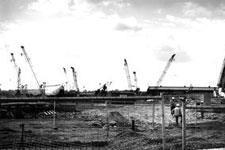CIPS/Markit UK purchasing survey shows declining activity across all construction sectors, with new orders sharply down
The UK construction market is contracting rapidly, with commercial activity in particular falling at a record rate, according to data from the Chartered Institute of Purchasing & Supply (CIPS) and Markit UK.
Their latest purchasing managers' index shows that the construction economy shrank more strongly in September than in the previous month, with housing and commerical sectors both falling faster. However, in civil engineering - once again the best-performing sub-sector - the decline slowed to only a marginal contraction last month.
In the building sector overall, new orders, purchasing and subcontractor usage were all strongly down, alongside employment, with construction firms cutting staff numbers at a record pace.
Most survey participants attributed the continuing industry decline to the wider financial crisis and poor global economic conditions. These conditions have left firms are struggling to win new work, and the seasonally adjusted new orders index posted its second-lowest reading in the survey history.
Gemma Wallace, economist at Markit said: "There can be little doubt that the UK construction economy is now mired in a recession, and one that is likely to prove difficult to recover from.”
She added: “Although there were promising signs in August of an end to the downward trend in the key indexes, September figures showed a renewed slide."
The index registered a headline figure of 38.8 in September, a marked deterioration from 40.5 in August. The seasonally adjusted housing and commercial activity indices registered 26.1 and 36.4, respectively.
Roy Ayliffe, director of professional practice at the CIPS, said: “Housing again took a battering and was joined by the commercial sub-sector in terms of bleak performance. In the face of myriad obstacles, including rocketing energy prices, UK constructors were dejected and their confidence about the future performance of the sector hit a record low.”



























No comments yet